John Berry on CFN Live
June 27, 2025
Our National President John Berry was a guest on Catholic Faith Network to talk about the Society of St. Vincent de Paul and our nationwide campaign on homelessness prevention.
June 27, 2025
Our National President John Berry was a guest on Catholic Faith Network to talk about the Society of St. Vincent de Paul and our nationwide campaign on homelessness prevention.
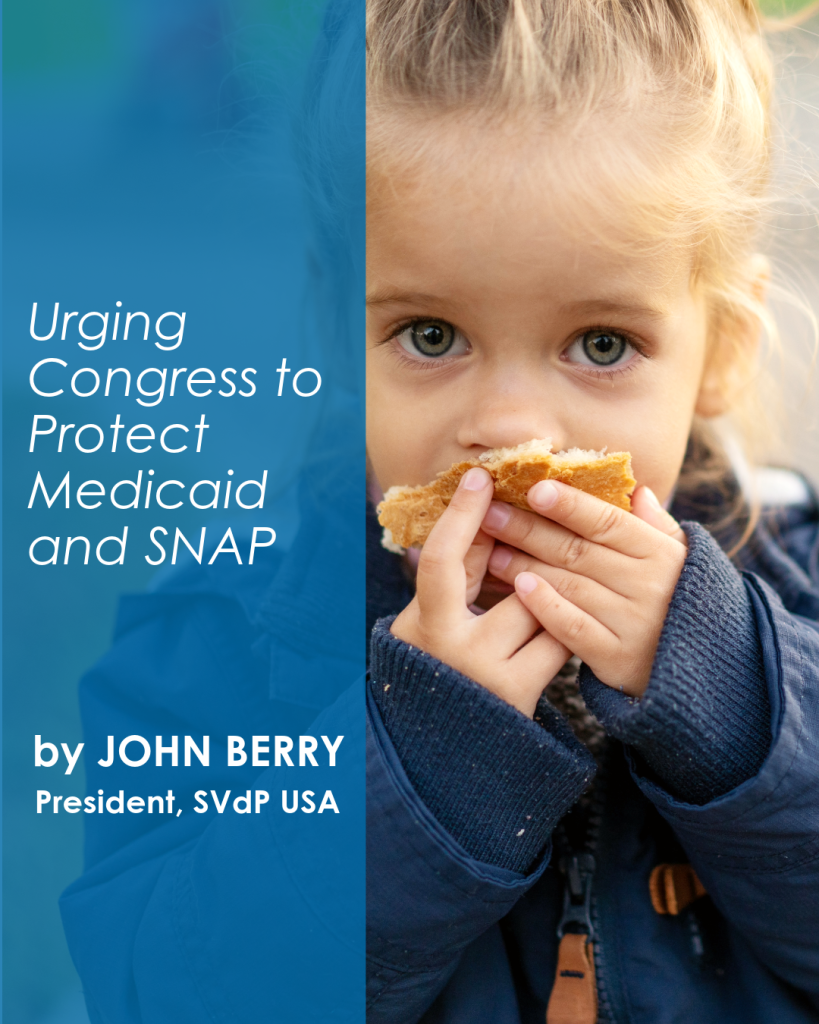 SVdP USA National President John Berry Urges Congress to Protect Medicaid and SNAP
SVdP USA National President John Berry Urges Congress to Protect Medicaid and SNAPAs Congress tries to pass the so-called One Big Beautiful Bill Act, my fellow Vincentians and I are deeply troubled that some members of Congress see the bill as a hammer and our social safety net as the nail.
While the Senate Parliamentarian has ruled against inclusion of concerning provisions that would act as cuts to Medicaid and SNAP, one thing remains clear: This bill in its current form will have an unprecedented and devastating effect on the poor.
The cuts are staggering. The legislation, as passed by the House, would slash $793 billion of Medicaid funding over the next 10 years, which the Congressional Budget Office estimates will lead to 10.3 million fewer people enrolled in this lifesaving program. It would also lead to nearly $300 billion in funding cuts over the next decade for the Supplemental Nutrition Assistance Program, resulting in an estimated 7 million people losing or having significantly lowered SNAP benefits.
This means that millions of children will go unfed, millions more adults and those with disabilities will lose health care benefits, and the gap between upper incomes and those on the lower end will widen.
The Society of St. Vincent de Paul USA recognizes the fiscal pressures that Congress and our nation must address. But we must also ask why the poor must suffer the most – and suffer they will.
As one of the largest organizations serving the poor, our lived experience and our Catholic tradition teaches us that parts of this legislation run counter to our moral values. Our Vincentian volunteers are on the ground, striving daily to alleviate poverty in every corner of the land. Our food pantries, thrift stores, and charitable pharmacies are found in urban and rural America, in red states and blue states.
So, today, we are advocating for those too often left behind, forgotten, and marginalized and for our own volunteers in asking Congress to reconsider these painful and unfair proposed cuts. It is time for our voices to be heard.
To those in Congress, we ask that you open your eyes and hearts to those who are suffering and the systems that perpetuate poverty in this, one of the richest nations in the world. As Pope Leo XIV put it so well recently, “Helping the poor is a matter of justice before a question of charity.” Let us commit today to building a more just world that elevates us all.
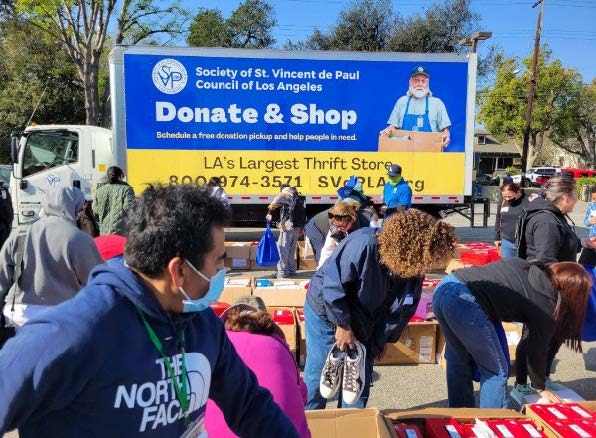
Walking amid the ashes and ruins of the wildfires in January, Ana Gonzalez could feel the anguish of families who were now homeless. Gonzalez, with the Society of St. Vincent de Paul, was there to offer comfort, hope, and something else.
For 20 years, the Society of St. Vincent de Paul’s disaster relief organization, Disaster Services Corporation (DSC), has provided victims of natural disasters with new furniture and other material needs through a program with an appropriate name: House in a Box™ . Born in the aftermath of Hurricane Katrina in 2005, the Catholic lay charitable organization and the Vincentian volunteers who run it have worked with victims of tornadoes in the Midwest, hurricanes along the East and Gulf coasts, and fires like the historic ones that ripped through southern California.
When disaster strikes, insurance may help rebuild a new home, but it often fails to cover the cost of refurnishing. For those living on the edge already, that’s a cost they often can’t bear. House in a Box™ allows families the opportunity to make a home livable again.
House in a Box™ is just that – a box of furniture and other goods that arrives on their doorstep. Each House in a Box™ package includes beds, linens, dishes, cookware, dressers, silverware, bathroom essentials, dining sets, and a comfortable couch.
“(You see) the joyful gasp on someone’s face when they see this literal box of things that they never thought that they would have a chance to receive as they try and rebuild their lives,” said Gonzalez, the Vincentian Services Members Coordinator for SVdP in Los Angeles.
“You see that vulnerability, that gratitude.”
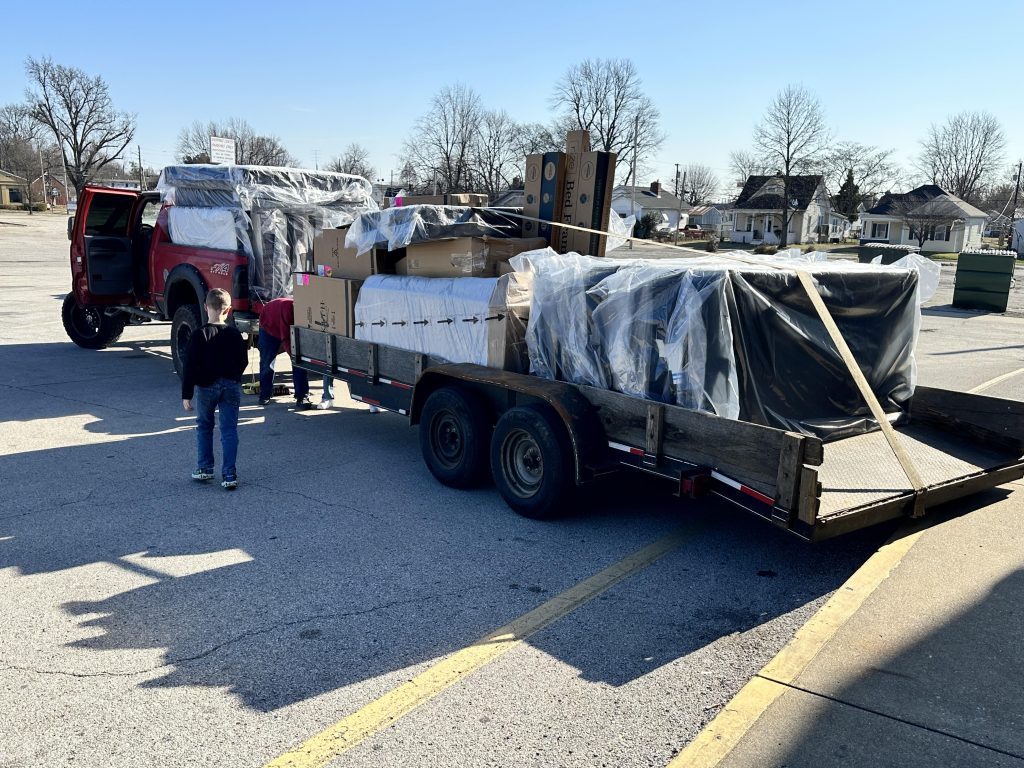
‘Beds for Everyone’
The program’s launch point happened in 2005 after Hurricane Katrina., This led to what DSC Chief Operating Officer Kevin Peach said was likely the largest resource mobilization effort in Vincentian history.
“House in a Box came out of Hurricane Katrina, out of that need, and that gap that the Society filled,” said Peach.
“Twenty years later, it has evolved dramatically to the point where we are now partnering with some of the largest corporations in America. We work closely with Amazon Business (and) Walmart, and we’ve also been approached by businesses like Wayfair who want to work with the Society.”
DSC has now streamlined and improved House in a Box™ to better meet families’ specific needs at no charge, but with a donated value of at least $3,400 per “box” and often much more according to a local SVdP Council leader.
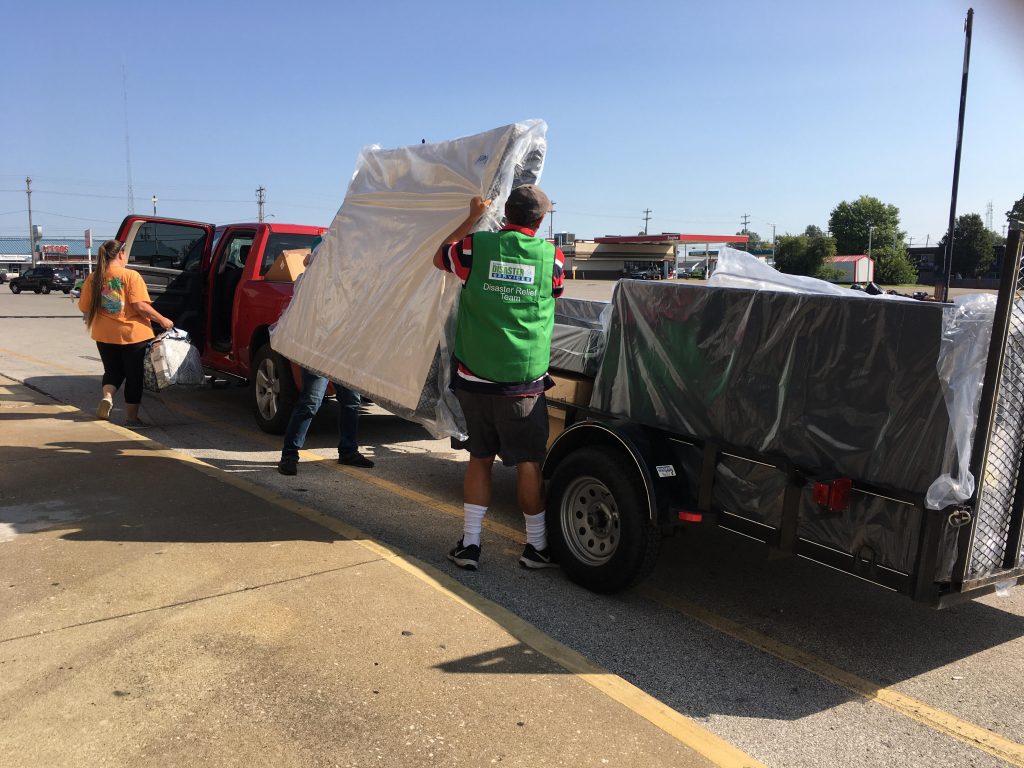
The human element
SVdP’s programs also open the doors for struggling neighbors to have options – a reclaiming of dignity that many in such situations rarely receive.
“Not all disasters, communities or households are the same. After Hurricane Helene last year, the biggest request by folks in Tennessee was vacuum cleaners,” Peach said. “They wanted to make sure that their children had clean carpets and floors to play on. Folks in Louisiana had air conditioners as the number one requested item.”
“The children can pick different types of bed sheets. The adults can pick different colors of the sofa they want,” Peach said.
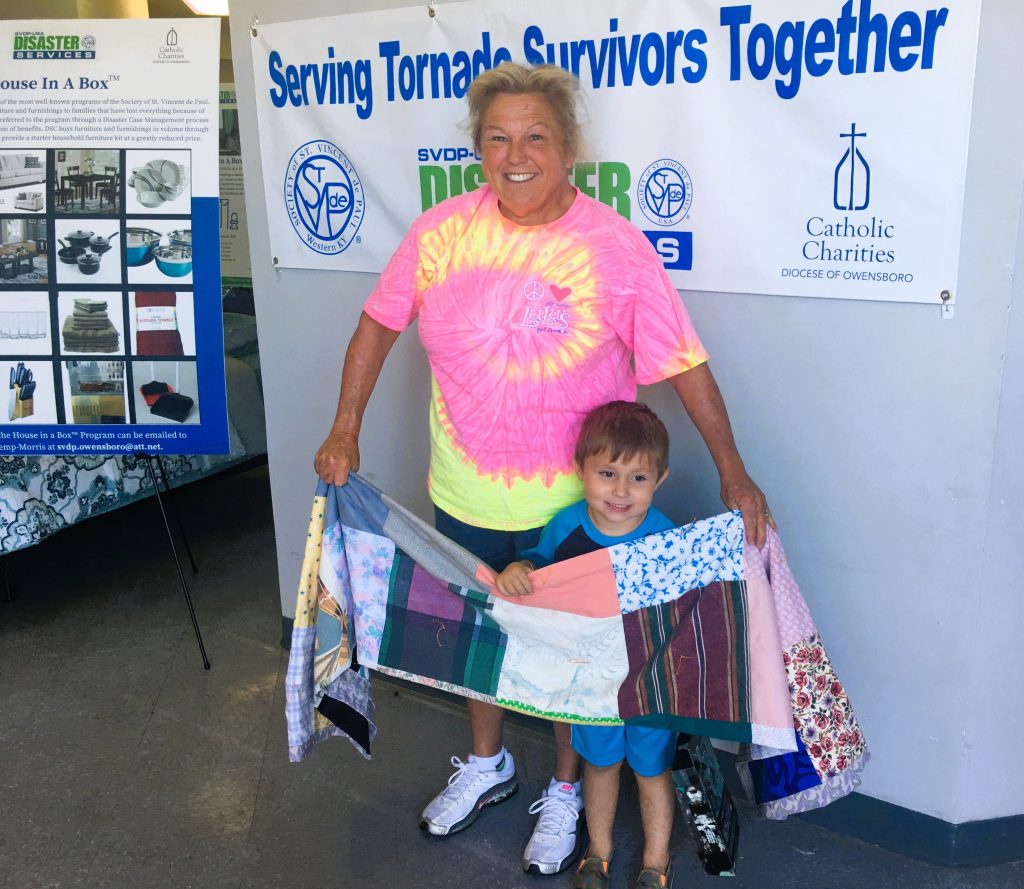
“Instead of being prescriptive, where everyone gets the same thing, we really brought in that human element so that they had more choice in the program.”
Time becomes the other critical element to the House in a Box™ formula.
“[Families] don’t have to wait months and months for us to find a local warehouse, staff it, and then have items shipped in and distributed,” said Peach. “We’ve had scenarios in Tennessee where a survivor would apply for the program and within 24 hours, they would have all 45 products delivered to their front door. You can’t put a price on that.”
SVdP supports families through long term recovery so they can rebound back stronger. For so many families, this campaign of Christ’s love became the difference maker in helping families build a workable “new normal.”

“We got flooded with pictures when children’s bedrooms were set up with House in a Box. One family said, ‘All of a sudden they heard their daughters down the hallway playing again, laughing again, that hope that’s instilled in the beauty of recovery.’” said Richard Remp Morris, CEO of the Society of St. Vincent de Paul of Western Kentucky.
“They really felt like there was a renewed belief, a sense in, ‘We’re going to rebuild and be better.’”
DSC estimates that between the tornadoes of Western Kentucky in 2021, Hurricanes Helen and Milton in 2024, and the Los Angeles-area wildfires of 2025, Vincentians empowered more than 2,100 families with hope through House in a Box™.
For more information, visit www.svdpdisaster.org.
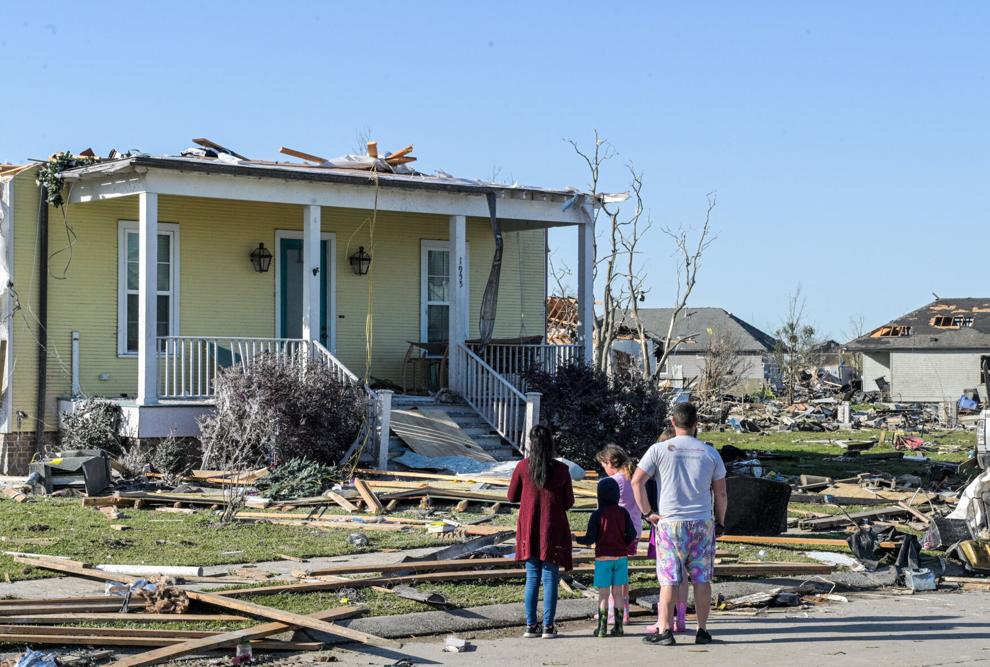

Every day, Society of St. Vincent de Paul pharmacist Kellie Elisar sees the fallout of a broken system: Patients who can’t afford insulin, seniors choosing between blood pressure medication and groceries, grieving spouses who can’t pay for prescriptions.
“I find some days I’m a sister, sometimes I’m a mother, and sometimes I’m a social worker,” says Elisar, who is in charge of SVdP’s charitable pharmacy in Baton Rouge, La. “It just depends on the day and the need that the patient has.
“Today, we had a gentleman that came in and he lost his wife. Financially, things just completely changed for him. He was so used to having extra Social Security income from his wife, and they would pay everything together. And then, ‘Whoa, now what do I do?’”
At a time when soaring drug prices remain a major political issue, SVdP’s innovative charitable pharmacies have long been working at the grass roots to address the immediate needs of people in places such as Baton Rouge, Dallas and Cincinnati. It’s in these facilities that hope beckons for people whose day to day lives are overshadowed by the need to pay for medicine.
“Medicine or food, food or medicine. When you’re making those kinds of choices, it’s not really a choice,” says Michael Acaldo, Society of St. Vincent de Paul USA’s National Chief Executive Officer.
When he was the president and CEO of the Greater Baton Rouge Council in 1995, he encountered too many people forced to make such a choice.
“Back in 1995, there was no Medicare Part D,” he said. “Even on just regular Medicare and other income, they could have prescription medicines that cost more than their entire monthly budget combined.
“If it’s a chronic disease, their call isn’t just for help today or this month. It becomes a long-term problem.”
Acaldo organized his Baton Rouge team to create SVdP’s first charitable pharmacy, one whose concept of long-term free pharmaceutical support has now spread nationally. Sometimes people walk in to the pharmacies. Other times, Vincentians discover the needs of people during one-on-one Home Visits with the people they serve.
“What a powerful opportunity [when we] fill that prescription every month. That is a heart, soul-driven activity because that is us really connecting with Christ.”
The work couldn’t be done without people, companies and organizations that are generous with their treasure, their time, and – yes – their pharmaceuticals.
“On a daily basis, we are getting donations from the public (and) nursing homes,” Elisar says. “They had somebody that passed away, or they had mail order sending me bottles of medicine where people don’t know what to do with them because their insurance covers it and they call and ask if we can use it.
“We put dates on them and make sure that everything is compliant with the pharmacy board. That allows me to have the access to be able to fill prescriptions that are very, very expensive.”
Elisar, her team of two staff and about five volunteers have a daily encounter with Christ through these recipients.
“I’ve literally had somebody come in and they said, ‘Thank you for being kind. Nobody has been kind to me today.’ I’m getting chills just thinking about it. How did you not see Christ in every single person that walks through this door?”
Cincinnati Builds a Legislative Path
This innovative model was eventually adopted by SVdP Conferences and Councils across the country and even helped inspire legislation in Ohio to open the door for charitable pharmacies.
“We were meeting with our neighbors and learning more about some of their challenges,” says Brad McMonigle, CEO of St. Vincent de Paul Cincinnati. “It became a pattern where they were having to choose between buying food, paying rent, taking their medication as prescribed or not taking it at all.
“The leadership in Cincinnati actually assisted in drafting a bill in Ohio to allow for charitable pharmacies. That bill was passed, and in 2006, the charitable pharmacy in Cincinnati was launched.”
Originally, the Cincinnati effort led to 7,000 prescriptions filled in the pharmacy’s first year. Now, the Cincinnati pharmacy is on target to reach its 110,000th prescription this year.
“We will fill their first 30 days with very little questions asked, because we know that they’re not coming with all their paperwork, all their proof of income. They’re just coming in in desperate need,” McMonigle says.
“We will schedule an appointment for them to come in with all that requested information, to see if they then are approved for ongoing care. Once they come under our care, we’ll serve them until they either are able to obtain insurance or they have a better income.”
Offering Spiritual Medicine
The SVdP Dallas pharmacy started similarly through the work of one longtime Vincentian, Hank Herman, whose dogged work with state legislators allowed Saint Vincent de Paul North Texas to open its doors in 2018 and offer more than 400,000 free prescriptions in seven years.
“It’s one of those things where we know that we literally are saving people’s lives because of the medications that we’re giving,” says Luis Gonzalez, CEO of St. Vincent de Paul North Texas.
“We have one patient, a young adult diabetic. We’ve been taking care of her since she was 15 years old. Last year, she told us, ‘I’m going to college because you saved my life. I can go to college and have a life because you’ve been taking care of me and giving me medications.’ Those kinds of things happen to us all the time.”
To maintain and expand their reach, such innovative ministry needs financial support, the kind that Gonzalez says brings an incredible return on compassionate investment.
“The value of these medications, from a pure financial standpoint for an investor, a dollar in is about $35 to $40 worth of value going out the door because of the value of the medication,” he said.
That’s beyond the spiritual medicine that people like Elisar and her team, and similar St. Vincent de Paul pharmacy teams, offer those in need.
There are now seven St. Vincent de Paul charitable pharmacies across the country that provide long-term low-cost or free pharmaceutical support to their communities. SVdP pharmacies can be found in Atlanta, Baton Rouge, Biloxi, Cincinnati, Dallas, Houma, Madison, and Monroe. Access to health care has completely transformed the lives of those in need.
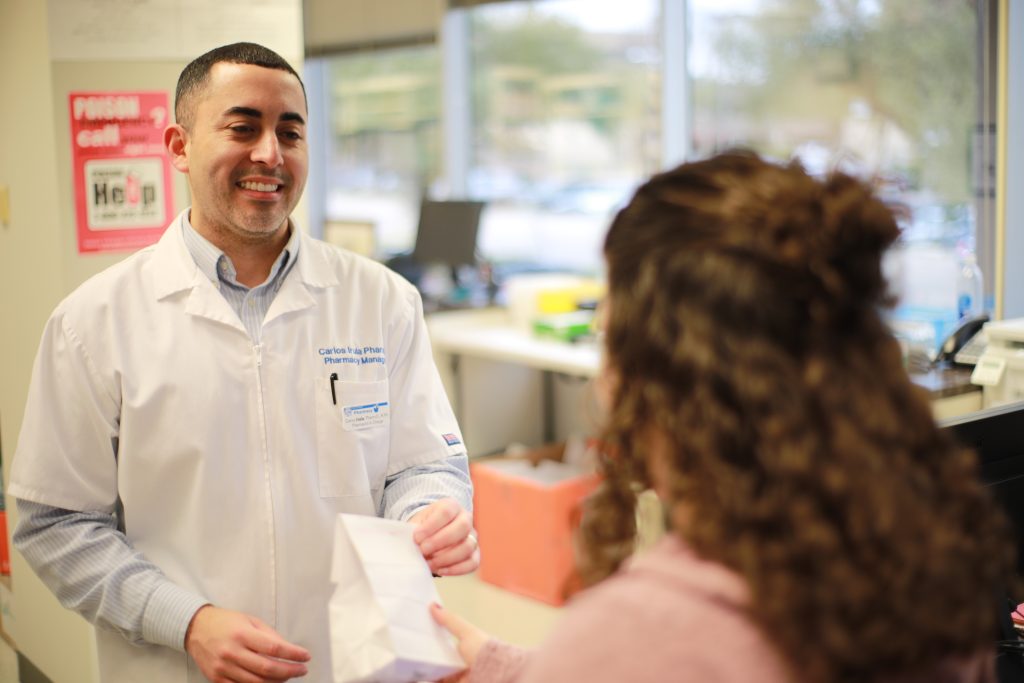
Click on the following links to learn more about St. Vincent de Paul charitable pharmacies:
– Atlanta | Baton Rouge | Biloxi | Cincinnati | Dallas | Houma | Madison | Monroe
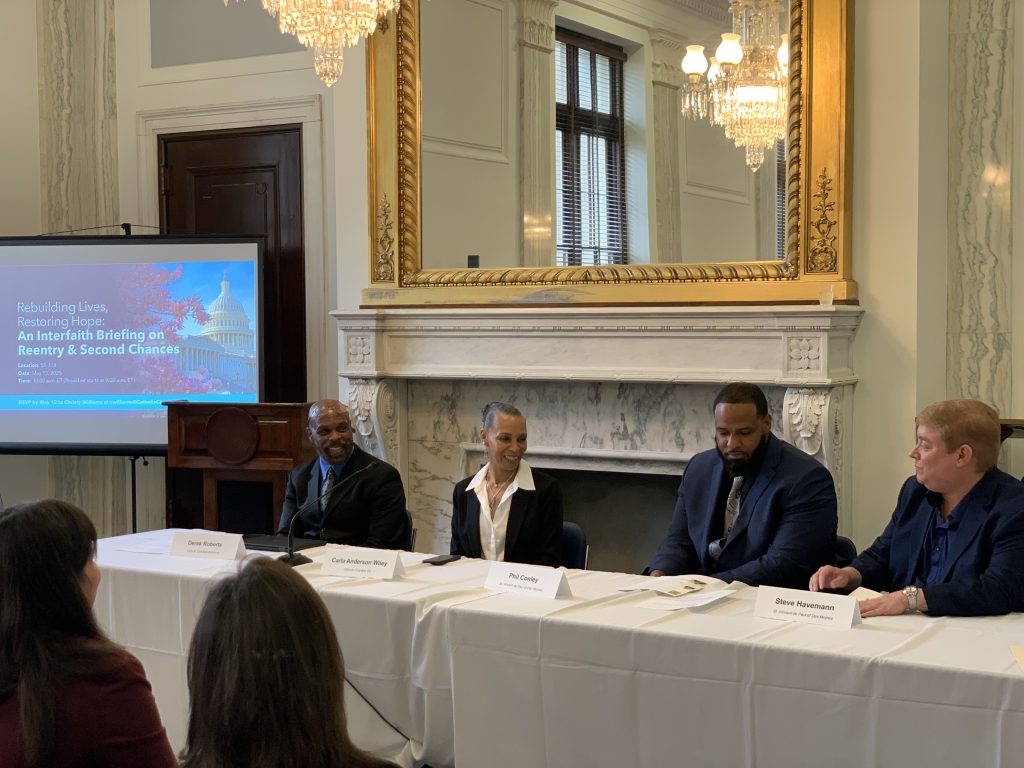
Phil Conley didn’t grow up expecting to speak in the halls of the U.S. Senate. Raised on the South Side of Chicago, he lost his father at a young age and saw violence, drugs, and incarceration shape nearly every aspect of life around him.
“The only thing I saw getting rewarded was violence,” he said. “A lot of people that worked in my family sold and used drugs. I didn’t see many people working jobs or going to church.”
But on May 13, Conley flew from Des Moines, Iowa, to Washington, D.C., to do something he never imagined—share his story with congressional staffers in the Russell Senate Office Building and advocate for the re-entry programs he now helps lead as a mentor.
The event, hosted by the Society of St. Vincent de Paul USA (SVdP), Catholic Charities USA, the National Religious Campaign Against Torture, and the Jesuit Conference Office of Justice and Ecology, brought together more than two dozen Senate staffers and policy stakeholders to hear firsthand how second chances, when rooted in faith, dignity, and real support, can break cycles of incarceration and restore lives.
The event was a powerful introduction to SVdP’s growing advocacy presence in Washington, made possible by the organization’s new national office and the recent appointment of Ingrid Delgado as National Director of Public Policy and Advocacy. SVdP opened the office in April to advocate on issues related to poverty, homelessness, and the needs of vulnerable populations, including support for faith-based re-entry programs. SVdP is using its platform as one of the largest charitable organizations in the country—serving more than five million people annually through person-to-person assistance, housing programs, food support, disaster relief, and more—to shape federal policy.
Conley’s remarks highlighted not just his own journey, but the importance of lived experience in informing policy. Now a business owner, father, and mentor, he continues to walk alongside others returning home through SVdP’s Immersion Program in Des Moines, a Second Chance Act grant recipient.
Steve Havemann, CEO of SVdP Des Moines, emphasized just how impactful that program has been.
“The state’s average recidivism rate is 45%,” he said. “For our Immersion Program, it’s 18%.”
The program focuses on the first 72 hours after release, providing returning citizens with housing, mentorship, job readiness, and community support.
“Poverty can be a full-time job,” Steve said. “If we want to break cycles, we have to invest in people, not just systems.”
That message reflects SVdP’s Vincentian model. The work of the Society’s more than 90,000 volunteers is built on one-on-one relationships. Whether it’s helping someone return home after incarceration or assisting a neighbor with rent or food, SVdP believes in meeting people where they are, offering support, dignity, and hope without judgment.
The panels brought SVdP’s values to life through powerful, personal testimonies. Johnny Perez, Director of the U.S. Prisons Program at the National Religious Campaign Against Torture, spoke about the lasting trauma of solitary confinement and why humane, faith-led solutions are essential. Courtney Everett, Director of Finance and Development at Saint Louis University’s Prison Education Program, urged attendees to support the reauthorization of the Second Chance Act and shared how education transformed his own re-entry journey.
Conley participated in the second panel, which continued the conversation through lived experience. Carla Anderson (Wiley), now Program Manager at Catholic Charities, offered her perspective on the challenges women face post-incarceration, describing the simultaneous pressures of finding housing, employment, and regaining custody of children. Derek Roberts, founder of Ageless Generations, and Steve Havemann rounded out the discussion with reflections on what’s working and what still needs to change.
“Faith-based organizations like SVdP don’t just advocate from a policy platform. We advocate from lived experience and deep relationships in communities across the country,” said Ingrid Delgado, SVdP’s National Director of Public Policy and Advocacy. “That’s what makes our voice in Washington both credible and urgently needed.”
The message from every speaker was clear: faith-based re-entry efforts work. Panelists pointed to the unique role faith communities play in offering long-term accompaniment, moral clarity, and a sense of hope, especially for those society often overlooks.
These are the kinds of community-rooted, person-centered solutions SVdP advocates for through legislation like the Second Chance Act, through national partnerships, and by ensuring that policymaking includes the voices of those with lived experience.
As SVdP expands its national advocacy, these are the voices it’s bringing to the table.
“If you had told me 15 years ago this would be my life, I wouldn’t have believed it,” Conley said at the close of the event. “But now I’m living it. And I’m not stopping here.”
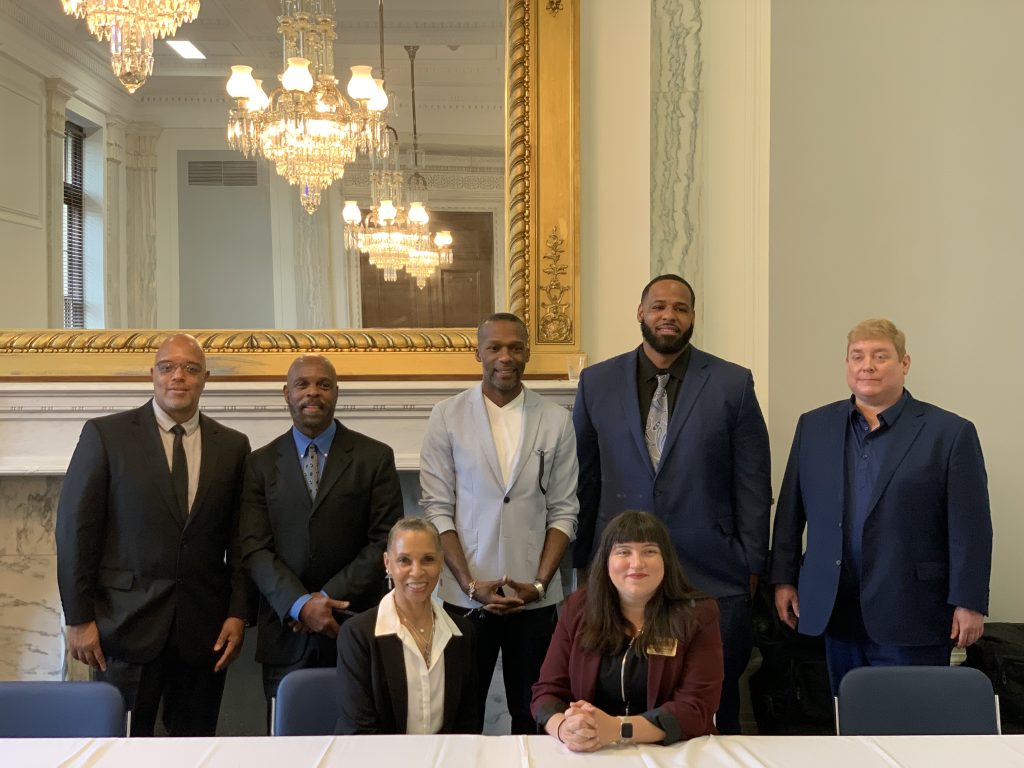
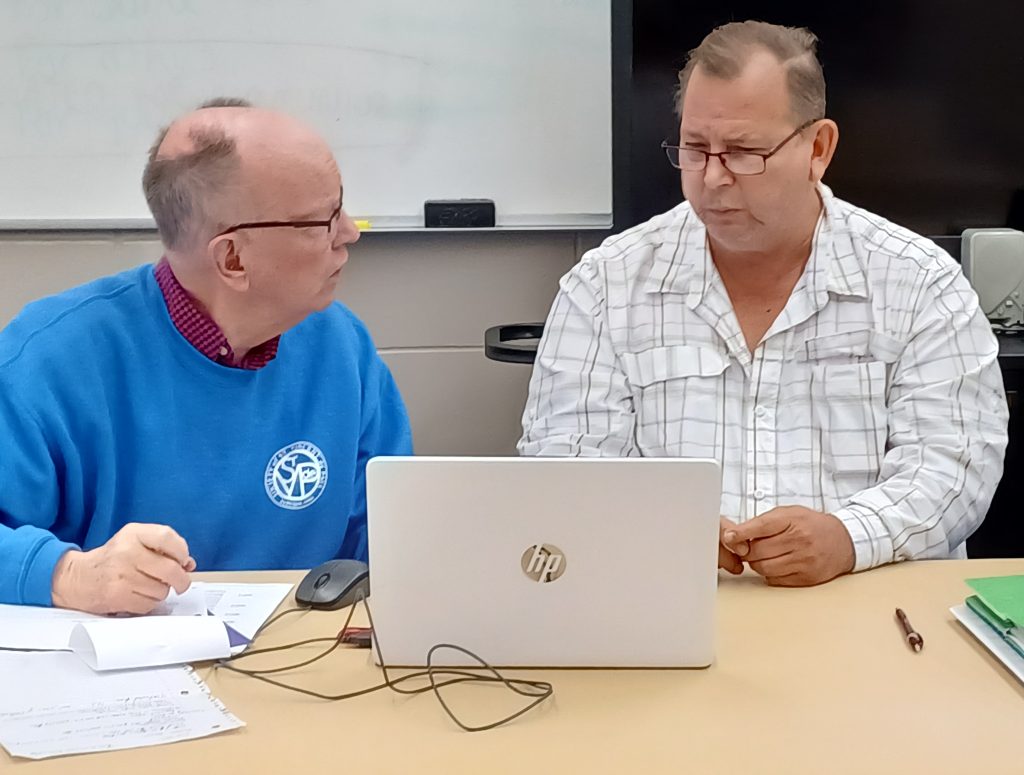
In 2017, two years into his tenure as CEO of the Society of St. Vincent de Paul (SVdP) in Des Moines, Iowa, Steve Havemann had an eye-opening realization: 34% of the people being served by SVdP Des Moines had been incarcerated at some point in their life.
That’s just the tip of the iceberg. The 6th Avenue Corridor in Des Moines — a community served by SVdP — is the most impoverished and underserved in the city, according to Havemann. It is the least accessible by transportation, has the highest crime rate, and has an average household income of about $11,000.
Not only is it hard to find jobs there, but those who are unemployed, ironically, can’t afford to get a job.
“You have workforce training programs that are 8-12 weeks long and are unpaid,” said Havemann. “So, people are asking themselves, ‘How am I supposed to buy dinner tonight? How am I supposed to survive until Friday? My entire day is consumed and I’m not making any money for 12 weeks.’”
That’s when SVdP’s Back2Work program was born. Back2Work provides customized training, continuing education, community resources, and connectivity for people on the journey to reemployment, all while providing a livable wage. The 1.5-week program connects individuals impacted by incarceration, poverty and homelessness with entry-level opportunities in pre-apprentice, apprentice, and journey career pathways.
Since piloting in Des Moines, Back2Work has been adopted across the country by SVdP Councils in major cities such as Seattle, Oakland, Baltimore, Orlando, Milwaukee, and more. Thus far, SVdP Des Moines has served almost 270 people through the program, ranging from younger adults — many without parents — to older adults who are struggling to provide for their families.
“Back2Work was really born out of listening to the concerns of our communities and asking questions, not being prescriptive,” said Havemann. “It wasn’t, ‘I’ve got the answer for you,’ but rather, ‘What if we work together and changed how we offer services?”
Individuals begin the program with résumé building and learning soft skills like financial literacy and career readiness. As the program progresses, they continue to build upon those skills and receive job shadowing opportunities at various employers. The final stages involve participants engaging in mock interviews, giving a recorded presentation to their peers, and fully transitioning into their new jobs.
The participant-to-employer relationship is further reinforced through SVdP Des Moines’ employer council. This network of 34 employers meets three times a year to advise on the Back2Work program, as well as communicating the progress of program graduates they’ve recently employed.
“That’s really one of the big things that is significant about this program — the follow-up piece, checking in and making sure everything is still going well for our former participants. If not, and sometimes that is the case, we provide interventions to help guide them towards success.”
Havemann and his 140-person team helped SVdP Dubuque, about three hours northeast, , adapt their own Back2Work program in late 2023. Led by Cindy Kohlmann, Director of Programming Services, SVdP Dubuque’s iteration of the program has served 70 individuals thus far, ranging from age 18 to 64.
SVdP Dubuque’s program emphases life skills training like cooking, saving money, and teamwork. Sessions feature guest speakers, including executive leadership from various employers.
Kohlmann said it’s not just about bridging access back to employment for these vulnerable individuals, but also giving them the confidence and tools needed to stay at work.
“Lots of times when the question is asked, “How do we get people out of homelessness?” the fast answer is that we get them a job. But that doesn’t solve all of their problems,” Kohlmann said. “SVdP’s Back2Work program addresses more than just work. It addresses things like communication, nutrition, and spirituality.”
One woman from Dubuque had a track record of impressive jobs which paid her generously, but couldn’t keep those jobs because of relationship issues with her colleagues, according to Kohlmann.
“She didn’t know how to relate to a manager or coworkers, which ultimately cost her all of these wonderful jobs.”
The woman enrolled in the Back2Work program last November, which helped her finetune interpersonal communication and relationship skills. She graduated from the program, landed a job, and is still with the employer today, said Kohlmann.
One man went from part-time dishwasher to full-time supervisor, thanks to the program. He had done three tours of duty in Afghanistan and went through the military’s reentry program, but nothing worked. He then got into trouble and spent 18 months in prison. Now, he is successfully reintegrated into the community, thanks to SVdP.
Kohlmann said everyone deserves a chance, even those at their lowest.
“I get a little emotional and a bit passionate about this because people tend to believe that there are throwaway people, and I don’t believe that.”
Said Havemann, “If they believe that they need assistance but lack the confidence or competence within themselves to go forward and excel, that’s part of our mission … to jump in and fill that gap.”
SVdP Des Moines recently received a federal block grant that will allow it to combine Back2Work with its IMMERSION/Reentry program, which provides mentorship and resources to returning citizens from incarceration. It is also pushing for funding to collect data and become registered as an evidence-based practice.
“The thing to remember is that it’s not just the participants themselves who benefit from our programs, but also their families, friends and surrounding communities,” Havemann said.
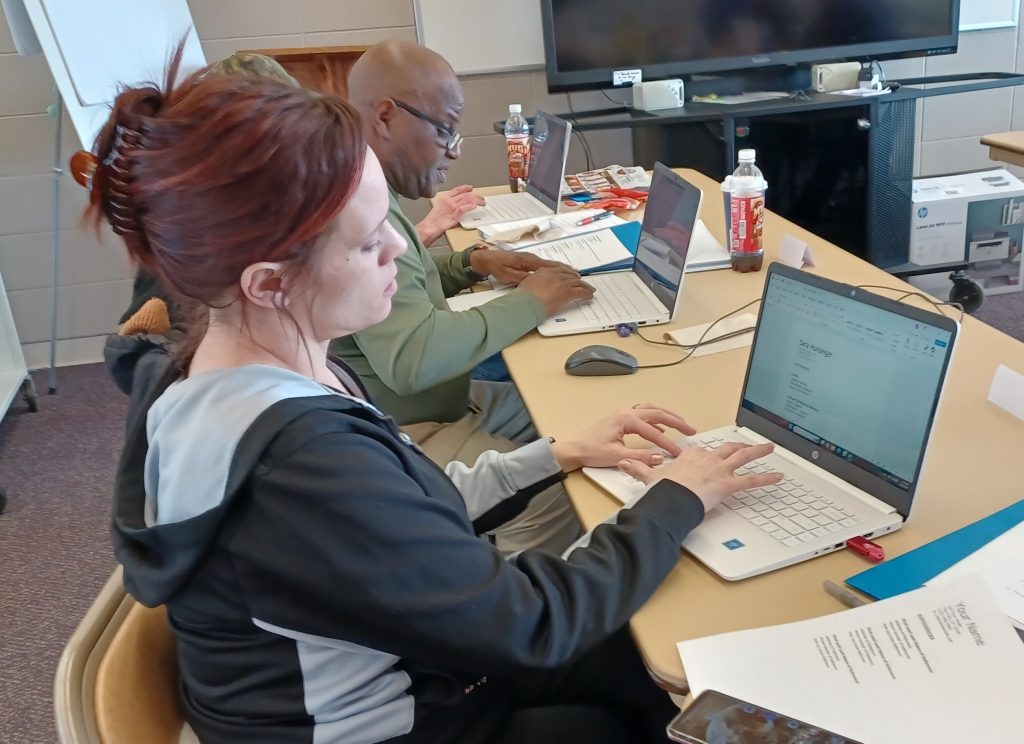
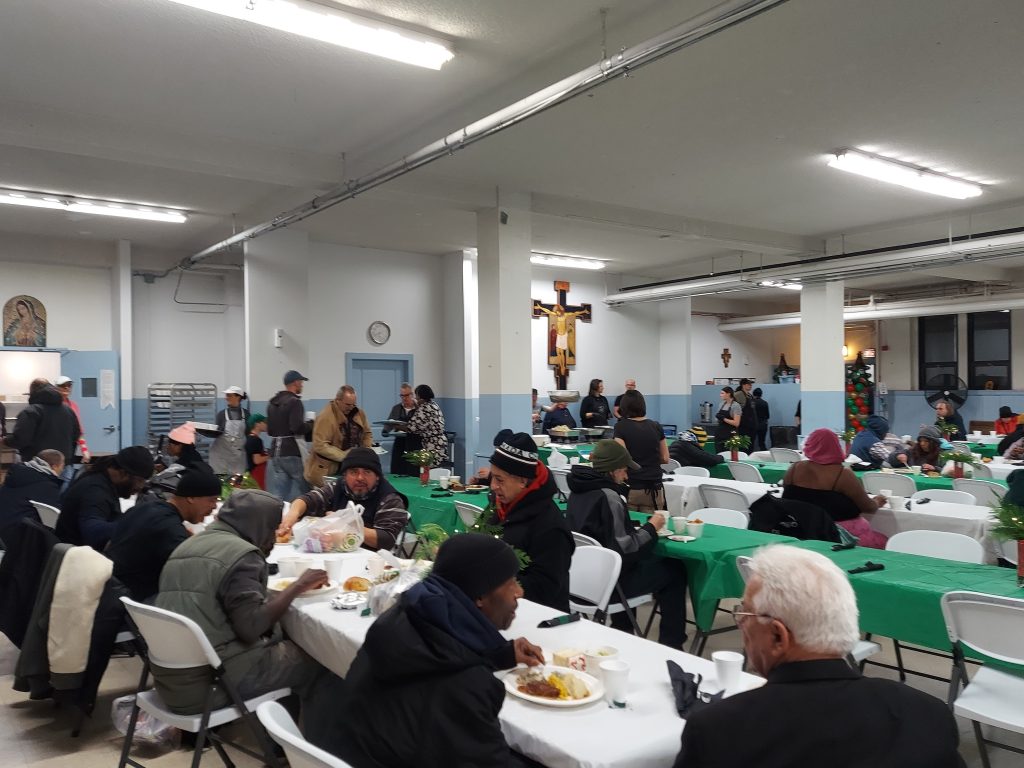
When Meghan McKern joined the Society of St. Vincent de Paul (SVdP) in Chicago, she wasn’t sure how she could help. As a fine dining chef with years of experience in Michelin-starred restaurants, she wondered how her skills fit into the hands-on, person-to-person service that defines Vincentian work.
“I’m not an academic,” she said. “But I’m a laborer. I wanted to do something real. I just didn’t know what.”
That changed after a simple moment — loading a car with donated supplies alongside Pam Matambanadzo, President of the Mary, Mother of God SVdP Conference in Chicago.
“She told me, ‘Everyone brings their talents. You just need to do whatever you’re comfortable with,’” Meghan said. “That opened the door.”
Together, they began to imagine what it could look like to offer not just a meal — but an experience rooted in dignity, community, and celebration. That conversation sparked A Seat for Everyone, a special New Year’s Eve dinner co-hosted with St. Thomas of Canterbury Soup Kitchen for about 100 guests, many of whom were experiencing homelessness. This is just a small fraction of about 5 million vulnerable individuals that SVdP serves per year.
Pam and Meghan didn’t want to serve just any meal. The goal was to create an experience that reflected a family-style holiday meal. With Meghan’s culinary background, she created a menu featuring braised beef, mashed potatoes, green bean casserole, corn, and carrots slow-cooked in the pan gravy. Dessert? Costco cake — at the special request of one of the regular soup kitchen volunteers.
The dining room was transformed. Balloon arches framed the entrance. Tables were covered in cloths and adorned with handmade centerpieces. Volunteers served the meal, plated with care, rather than handing out food in containers.
“For a lot of folks we served, New Year’s Eve used to be a time to gather, celebrate, dress up, go out,” said Pam. “Now, for many, it’s about survival — figuring out where they’ll sleep, how to stay warm. This night gave them a memory. A moment of joy and normalcy.”
Each guest also received a hoodie designed with original artwork by the parish pastor and sponsored by parishioners for $35. The garments were a gesture of warmth and welcome during the coldest time of year.
“There was one man who came in and just kept asking, ‘Is this really for us?’” Pam said. “He said, ‘Thank you for seeing us.’ That stayed with me.”
For Meghan, the night was transformative — not just for the guests, but for herself.
“Planning the dinner brought me back to my faith,” she said. “I realized I didn’t have to be perfect. I just had to show up. God would carry the rest.”
She spent most of the night in the kitchen, rotating dishes, checking trays, and making sure everything came out just right. Though she didn’t see many reactions firsthand, she heard stories in the days that followed about how the guests had felt honored, how the soup kitchen volunteers welcomed the collaboration, and how people kept asking when it would happen again.
Meghan remembers one helper in particular.
“I put a message out on the Nextdoor app asking for help,” she said. “Jess responded without asking for details — she just said yes and showed up.”
Meghan called her “a little angel.” Jess became her sous chef for the night, helping to prep and serve food throughout the evening. The two bonded over the experience, discovered they lived on the same street, and have since become friends.
“I think the Spirit was present,” Meghan said. “We were trying to serve others with care and intention, but we were also sitting at that table ourselves. It wasn’t us and them — it was just us.”
Plans are already underway to bring A Seat for Everyone back for Thanksgiving.
“Meals like this remind us what Catholic social teaching looks like in practice,” said Pam. “It’s not just about feeding people — it’s about reminding them they matter.”
Op-Ed Published 4/25/2025 in Real Clear Religion. Submitted by John Berry, National President of Society of St. Vincent de Paul USA
Why should a Catholic charity involve itself in advocacy? “Stay out of politics,” many would say. If you want to help the poor, stick with works of charity. Leave it to the experts to address the issues that cause or perpetuate poverty, dependency, and need.
As the president of the Society of St. Vincent de Paul (SVdP) USA — one of the largest religious charities in the country — I feel the weight of this question acutely.
At SVdP, we serve those in need without regard for their demographics or creed, no matter what political party is in power. But increasingly, I am convinced that the work of charity cannot, and must not, be neatly divided from the claims of justice. In other words: While SVdP is not a political organization, our work and our faith demand that we advocate for those living in poverty.
In America today, more than a half a million people every night experience homelessness. That number is rising, and the face of poverty is changing; seniors, women, single parents, and the displaced middle class have become a larger part of the more than 5 million people we serve every year.
A recent client at an SVdP in a Midwestern city exemplifies this trend. For years, Scott had worked hard and lived comfortably in the same home. Then his work hours were cut and his health declined; he had to assume primary caregiver responsibilities for his 80-year-old father and a fire forced them to leave their home. Just like that, he was facing homelessness and came to St. Vincent de Paul with nowhere else to go.
As Christians, we cannot simply walk by when we encounter suffering. We are called to act. But what kind of action is called for?
“It is too little to relieve the needy day by day,” wrote Blessed Frédéric Ozanam, the founder of the Society of St. Vincent de Paul. “It is necessary to get to the root of the evil, and by wise reforms to diminish the causes of public misery.”
Ozanam famously compared the work of charity to “the Samaritan who pours oil on the wounds of the traveler who has been attacked,” before adding: “It is justice’s role to prevent the attack.” The personal encounter with our neighbor in need must propel us into action. Charity alone is not enough. We must become fighters for justice.
I am not simply making a “treat the root causes” argument for why religious charities like the Society of St. Vincent de Paul should not shy away from pursuing policy change. I am saying we have a particular responsibility to advocate on behalf of those we serve. Why? Because the people best equipped to craft policy changes that will truly help the poor and suffering are those who have personally served them, spoken with them, listened to them.
It is with this responsibility in mind that the Society of St. Vincent de Paul is opening a second National Office, in Washington, DC. We will increase our efforts to advocate on behalf of those we serve and turn our focus more intensely towards the pressing issues of our time, particularly the scourge of poverty and homelessness that afflicts far too many of our fellow Americans. Recently, for example, we urged Congress to expand the Child Tax Credit. We also spoke out against cuts to the U.S. Department of Agriculture’s food purchase program for schools and foodbanks.
In so doing, we are not drifting from the proper scope of our mission: We are focusing it. SVdP volunteers across the country spend countless hours each year in service to those living on the margins. We don’t come to understand the situations of neighbors in need from books or think tank sessions. We learn by being with them, suffering with them, praying with them, caring for them, loving them. The direct relationship we have with our neighbors in need gives us perspective and insight that we must share with policy makers, like-minded nonprofits, and other organizations to help drive change.
In other words: Charity must lead us towards justice. The personal encounter with those in need obligates us to advocate on behalf of those we serve. If we understand the root of their struggles and yet do nothing to help address the underlying causes, how is that any different from seeing them hungry or cold and refusing to provide them food or warmth?
“When we have fulfilled this ministry, not for a few months, but for many years,” the Society of St. Vincent de Paul’s founder wrote, and when we have cared for those in need “at home, at school, at the hospital, not in one city only, but in many . . . then we begin to know the elements of this formidable problem of misery; then we have the right to propose serious measures, and instead of frightening society, we give it consolation and hope.”
So many struggling Americans need consolation and hope today. Those who serve them in charity must not hesitate to advocate on their behalf for justice.
Published in the Catholic Review Apr 4, 2025
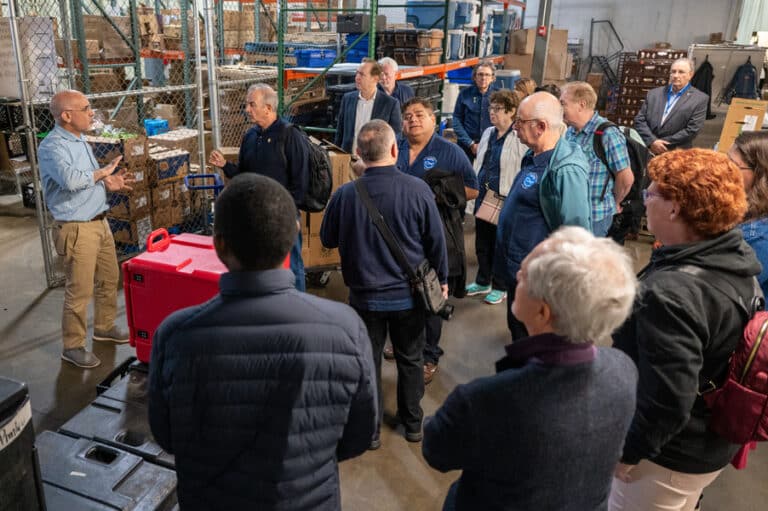
Majid Zaghari, left, vice president for enterprises with St. Vincent De Paul Baltimore, gives a tour of the Good Harvest Community Kitchen facility to leadership from the International Confederation of the Society of St. Vincent de Paul April 3 off Moravia Road. (Kevin J. Parks/CR Staff)
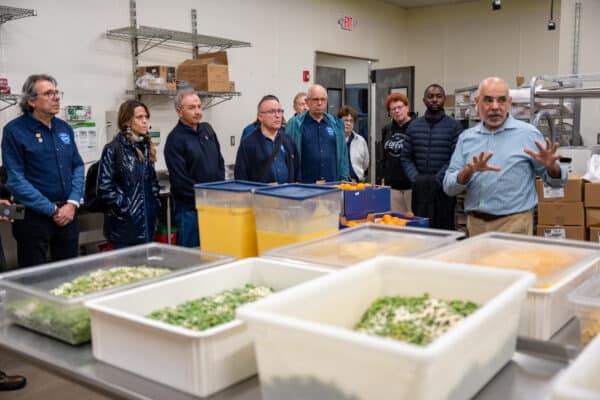
Majid Zaghari, vice president for enterprises with St. Vincent De Paul Baltimore, right, gives an April 3 tour of the Good Harvest Community Kitchen to leadership from the International Confederation of the Society of St. Vincent de Paul April 3 off Moravia Road. (Kevin J. Parks/CR Staff)
For the first time in its history, the International Council General Society of the Society of St. Vincent de Paul (CGI), met in the United States the week of March 31. Hailing from Europe, Australia, Africa and South America, the group of 12 international chapter presidents were hosted by John Berry, the national president of the United States of America, who took them on a tour from Atlanta to Washington, D.C., to Baltimore April 3.
“I think It is very important to meet in different cities and see what everybody is doing,” Berry said, as the group enjoyed lunch at Beans & Bread in Fells Point, one of St. Vincent de Paul Baltimore’s oldest programs. “I have learned from every place we’ve gone.”
The group was greeted by John Schiavone, president and CEO of St. Vincent de Paul Baltimore, who provided a brief history on the beginnings of Beans & Bread in 1977 by a former Benedictine priest who served free meals in a row house.
“He created a home-like atmosphere,” Schiavone said. “He would greet each person and play the piano.”
By 1986, more than 200 people a day were being served and the program was taken under St. Vincent de Paul’s wings. New programs about health, mental health and recovery were added. The center now also helps clients find housing and keeps in touch with clients to ensure they don’t become homeless again. A career center, where clients can receive help with résumés and applying for jobs, is in the beginning stages.
“It’s a work in progress,” Schiavone said, as he led the tour through the facility, which moved to its current location on Bond Street in 1992 and has gone through several expansions and renovations.
“We are similar in terms of the issues involved,” said Mark Gaetani, the national president of the Australian chapter of St. Vincent de Paul Society. “What I particularly like about it is the follow up.”
“I think this is fantastic,” said Elaine Heyworth, third vice-president general deputy of SSVP and national president of the United Kingdom, who appreciated how all the resources were under one roof.
Juan Manuel Buergo Gómez, president general of the international confederation of the St. Vincent de Society board, of Spain, who spoke through his interpreter Isabel Garzo, executive assistant to the president, also was impressed with the programs at Beans & Bread and at Good Harvest, which the group visited prior to Beans & Bread.
“It is a very professional organization,” Gómez said. “It is working more as a company.”
Gómez, according to Garzo, thinks it would be even better “if the spiritual line was stronger,” suggesting that religious images such as crucifixes or of the founder of the St. Vincent de Paul Society might be added to walls of Baltimore outreach centers.
Gómez found the involvement of students – earlier Schiavone had spoken about a partnership with students and staff from Loyola University Maryland in Baltimore – interesting, noting the importance of good training and formation for both employees and volunteers “to establish a good relationship” to serve others better.
After lunch, the group had a tour of the Basilica of the National Shrine of the Assumption of the Blessed Virgin Mary in Baltimore and met with Archbishop William E. Lori. They visited Sarah’s Hope Family Shelter in Baltimore and then had dinner at the Rusty Scupper before returning to Bethesda.
Founded in Paris in 1833, the society is the largest Catholic organization in the world, with 800,000 members in more than 150 countries with 1.5 million volunteers. On the group’s final day, they celebrated the grand opening of the St. Vincent de Paul USA Washington, D.C., office with a ribbon-cutting ceremony.
“I am very proud of what we do,” Berry said.
Cardinal Christophe Pierre, papal nuncio to the United States, was set to bless the Society of St. Vincent de Paul USA’s new Washington office on April 4.
The office will be led by Ingrid Delgado, the society’s first national director of Public Policy and Advocacy and former associate director of Government Relations at the U.S. Conference of Catholic Bishops.
The society hopes that establishing a permanent presence in Washington will strengthen its efforts to highlight key issues related to homelessness and advocate for those affected by poverty to policymakers.
It’s hard to imagine what to do next after finding out that 1,300 kids in your local school district are homeless.
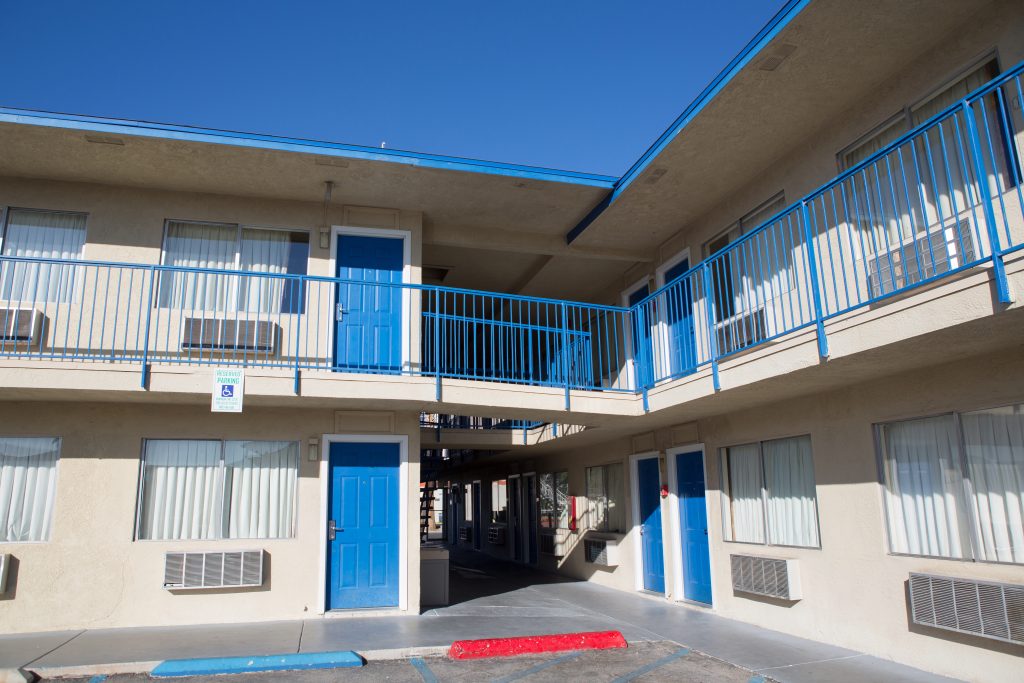
But Dan Kearns, Executive Director of the Society of St. Vincent de Paul (SVdP) Richmond Council, acted quicky. After learning last fall from Henrico County Public Schools that 113 of those students live in motels, Kearns and his Council extended a hand almost immediately.
Extended stay motels have become the only semi-stable housing available to many families living in poverty. If a family has been evicted, it can be hard for them to find another landlord who will rent to them. They sometimes end up in motels where, yes, they have a roof over their heads—but conditions are cramped, kitchens are almost non-existent, and the high living cost means it’s all but impossible to save towards a deposit on a more sustainable living situation.
“We knew there was a challenge – how do we help these people living in motels?” Kearns said. “And we knew that SVdP Georgia already had a program that served this population, so we mirrored it exactly after theirs.”
That program is Motel to Home, where SVdP staff and Vincentian volunteers provide financial assistance to families living in motels so that they can move into more stable housing. SVdP Richmond tailored the program to fit local needs, and since the program’s inception last October, they’ve worked with five families – three of which have moved into permanent housing.
Motel to Home is just one of many programs offered by SVdP with a focus toward homelessness prevention across the country – keeping families secure so that they don’t end up on the street. Among them are Home Visit Encounters – the heart of SVdP’s services – food pantries, shelters, thrift stores, dental clinics, charitable pharmacies, and much more.
Last year, SVdP USA served 5 million vulnerable individuals.
“I always look at SVdP as kind of the first responders to poverty,” Kearns said. “A lot of other organizations act almost as the extended care hospital, but what about people who are in an emergency? They can’t wait two or three weeks to get a phone call back. And I always say SVdP is really good at that – keeping the patient alive until we can figure out the root causes of their illness.”
A family must have income to qualify for the Motel to Home program, according to Kearns. When sitting down with the families to look at potential homes, SVdP recommends a monthly rent of about 40% of the family’s monthly income.
“We want you to be sustainable going forward,” he said. “We want you to stay in this home. So, at its core, a lot of it is financial counseling and direction.”
Take Tawanda from Richmond, for example. Mary’s Choice, a local faith-based organization that provides housing assistance, reached out to SVdP to ask that they help Tawanda and her two sons move into a home. They were all living in a motel at the time, and one of the sons was expecting with his girlfriend. Kearns sat down with the family, looked into an application, and discussed finances.
Once they determined the monthly rent the family could afford, Kearns and his team helped Tawanda and her sons move into a suitable home over the holidays. But that’s not all – they also helped furnish the home with brand new mattresses from a local SVdP thrift store.
Kearns still regularly checks in with Tawanda’s family.
“These individuals aren’t just a number. We don’t say, ‘Here’s your assistance … see you next month or maybe never again. Our services are efficient, but we also make it personal.”
Other SVdP Conferences across the country also help struggling families transition from motels to stable housing. The SVDP Conference at Sts. Joseph and Paul Catholic Church in Kentucky recently helped a mother and two sons move from a motel into a home and also secured a job for the mother. SVdP St. Louis, with the help from the St. Patrick Center and local parishes, raised funds to help a mother pay off a lingering hotel debt and move into a new home with her children. She was also given thrift store vouchers to furnish the home.
“We start with the heart here at SVdP,” said Kearns. “We don’t care what your situation is – we will figure it out. But first, we’re going to reach out to you to let you know we are here to help.”
